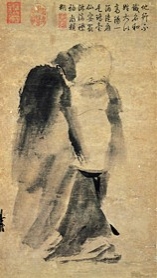|
Tags: National Palace Museum | painting | Sung dynasty
 Liang K'ai (fl. late 12th-early 13th c.), Sung Dynasty (960-1279) Liang K'ai (fl. late 12th-early 13th c.), Sung Dynasty (960-1279)
Album leaf, ink on paper, 48.7 x 27.7 cm
Second leaf from the album "Ming-hua lin-lang"
Liang K'ai excelled at painting figures, landscapes, Buddhist and Taoist subjects, as well as spirits and deities. He learned painting from Chia Shih-ku (fl. mid-12th c.), but he outdid his teacher in being able to convey the grace and bearing of figures. In 1210, he was promoted to the rank of Painter-in-Attendance at court and bestowed with the honored Golden Belt. For some reason, however, he refused and left the court with the belt hanging on the academy wall. Taking to a life of drinking and painting, he called himself "Madman Liang." When he was at court, his paintings were admired for their refined brushwork. This album leaf, however, is said to be a masterpiece from his period of drinking and spontaneous painting. The immortal shown here also appears to be somewhat inebriated. As a being of elevated status, his proportions also differ from those of ordinary mortals. The protruding forehead and rounded belly are accented by a few shods of hair and surrounded by unkempt robes that hang loosely down. No lines were used for these parts of the painting as only a few short slanted strokes were employed to define some of the details. Brushwork, however, defines the belt.
The painting was first sketchily rendered in light washes of ink, and then darker ink was applied before the washes had dried in order to convey the weight of the immortal's body. The remaining elements, such as the humorous facial features, were dotted to give the final touch to the immortal's mysterious qualities. Despite the brevity of the work, nothing seems to be missing. This type of brushwork, in which the number of brushstrokes is reduced, is often referred to as "abbreviated brush" and used in Buddhist and Taoist figure painting to convey the untrammeled and supernatural qualities of the supernatural beings. It is said that when Liang K'ai sobered up, he looked upon this painting with a sense of pride.
Text and images are provided by National Palace Museum
|













